Why do my eyes feel tired all the time?
If your eyes feel tired, it’s hard to motivate yourself to perform important work or even enjoy a night out. Many people assume that going about their daily lives with tired, dry eyes is par for the course when working at jobs that require long periods of looking at computer screens.
While digital eye strain may lead to your eyes feeling fatigued, it’s not the only culprit. We’ll explore other reasons why your eyes may be tired at the end of the day and how you can make small changes to feel more refreshed.
At CorneaCare, we believe that eye health starts with evaluating your overall health and lifestyle and making small changes that not only impact your eyesight but significantly impact your quality of life.
Key Points
- Eye fatigue can cause you to put off important tasks throughout the day.
- Not all symptoms of “tired eyes” are caused by staring at a computer screen. Several other lifestyle factors contribute to eye fatigue.
- Practicing good eyelid hygiene, giving your eyes and body proper rest, and getting regular eye exams can help prevent your eyes from feeling tired all the time.
What Are the Symptoms of Eye Fatigue
We have all experienced the feeling of heavy, tired eyes at some point. While each person experiences tired eyes differently, there are some common symptoms associated with eye fatigue:¹
- Dry eyes
- Watery eyes
- Blurred vision
- Red eyes
- Eye pain
- Sensitivity to bright light
- Headaches and migraines
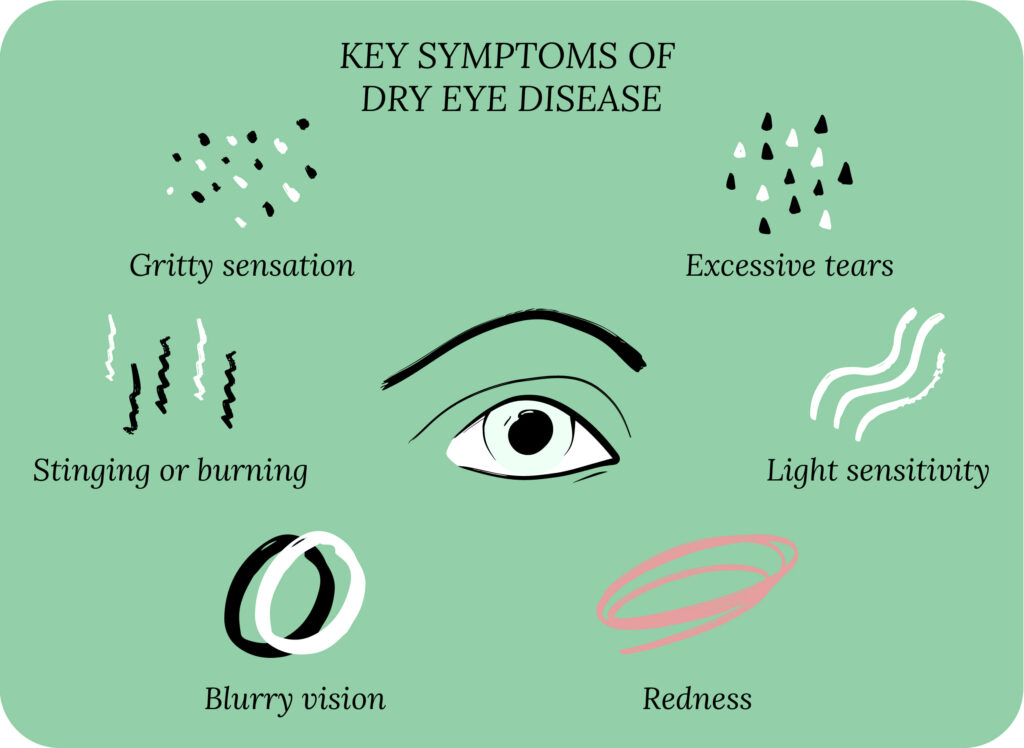
As you can see, eye fatigue symptoms can start to extend outside of just your eyes. If your eyes feel tired, you may tend to squint more, leading to headaches and even muscle pain in your face. The good news is that eye strain and eye fatigue symptoms are usually temporary and can be alleviated with simple adjustments at home and work.
Common Causes of Tired Eyes
There are many reasons why your eyes may feel fatigued. You may see eye fatigue and eye strain used interchangeably, but tired eyes can result from factors outside of eye strain. Understanding what may be causing your eyes to feel tired helps identify the right approach to alleviating your symptoms.
Lifestyle and occupation
Improving your eye health starts with assessing your current lifestyle and making small changes that can lead to positive outcomes. Factors like lack of sleep and the work you perform at your job and at home can affect how your eyes feel.
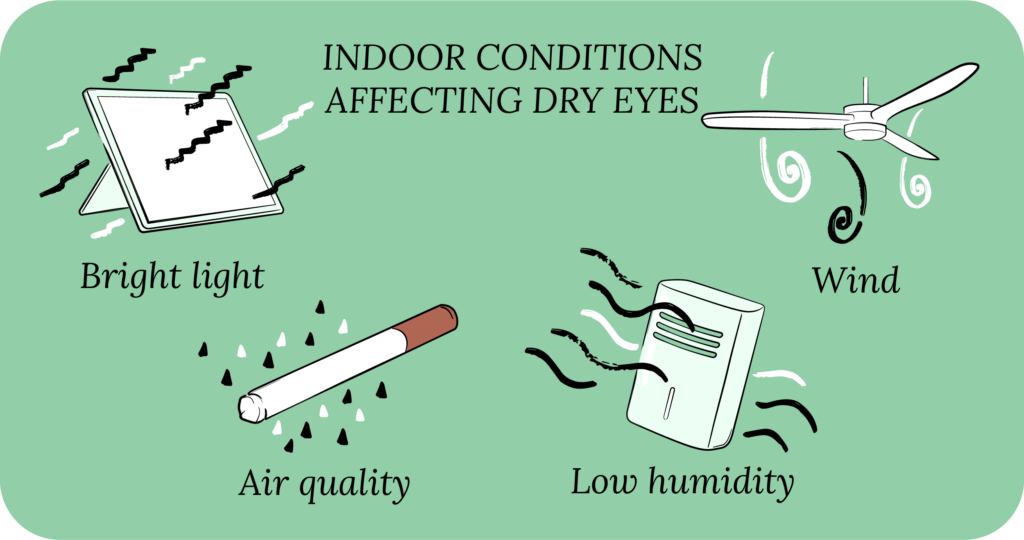
It may come as no surprise that lack of sleep contributes to eye fatigue. You’re tired, and so are your eyes. They may be red and bloodshot and you may need a bit of undereye concealer to hide your bags. Unfortunately, it’s not just appearance that’s affected by lack of sleep. Your eyes actually need rest to replenish tears, so when you miss out on getting that restorative sleep, your eyes feel dry, itchy and burn.²
The work you do and the environment at your job may also cause your eyes to feel tired. While you may think eye fatigue only affects those who work in front of a computer screen for a long period of their day, it also affects workers who are outside in the sun and tend to squint more.
Truck drivers and those on the road who need to see long distances and focus for hours on end may also suffer. Maybe your job requires you to work in dim light or darkness, which hampers the eye’s ability to focus.³ We know you can’t just up and leave your job to prevent eye fatigue, but there are some ways you can work with your environment and treat your eyes to the rest they deserve.
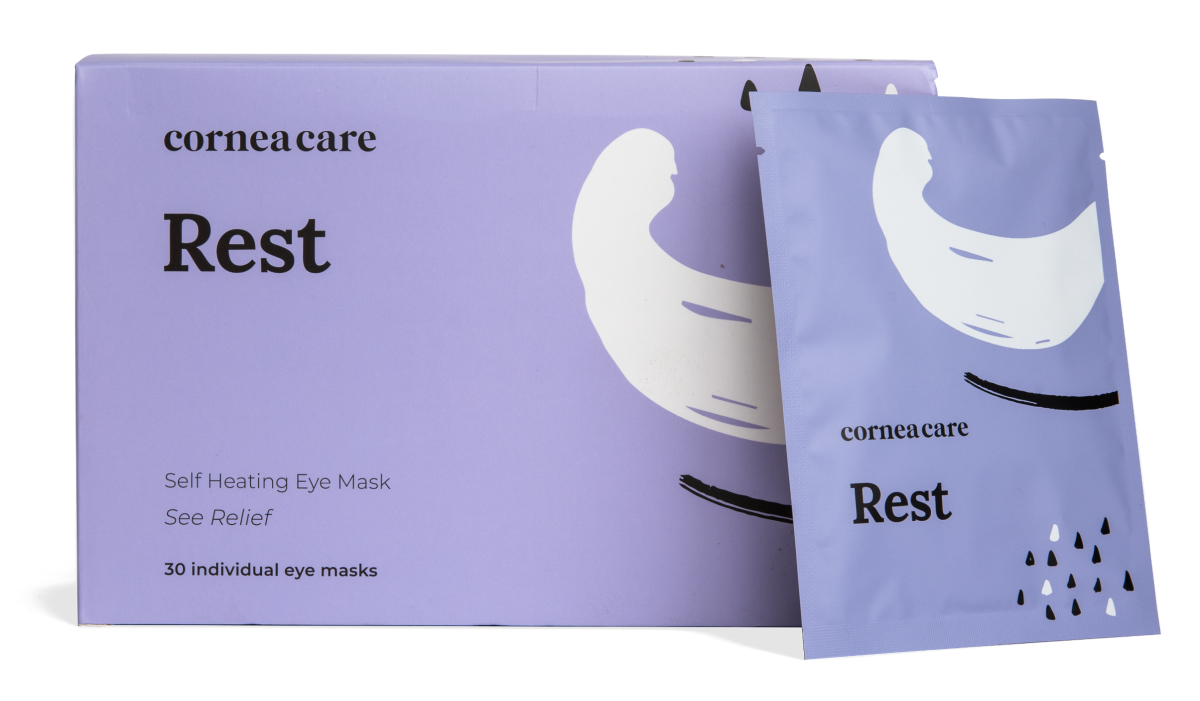
Rest
Warm Compresses
Perfect for eye dryness, fatigue, tearing, and puffiness of the eyelids. Free shipping 📦.
Try today - $30
Digital eye strain
Digital eye strain, also referred to as computer vision syndrome, describes a group of eye and physical health-related problems stemming from intense use of computers, tablets, smartphones, and TVs.⁴ Symptoms of digital eye strain occur due to lack of blinking, improper screen viewing distance, and straining to see low-contrasted small text.
According to the American Optometric Association (AOA), those at greatest risk for developing computer vision syndrome symptoms are individuals who spend two or more continuous hours in front of a computer screen or digital device every day.⁴ Sound familiar? If reducing screen time is not in the cards for you, keep reading to learn how to take care of your eyes while using digital screens.
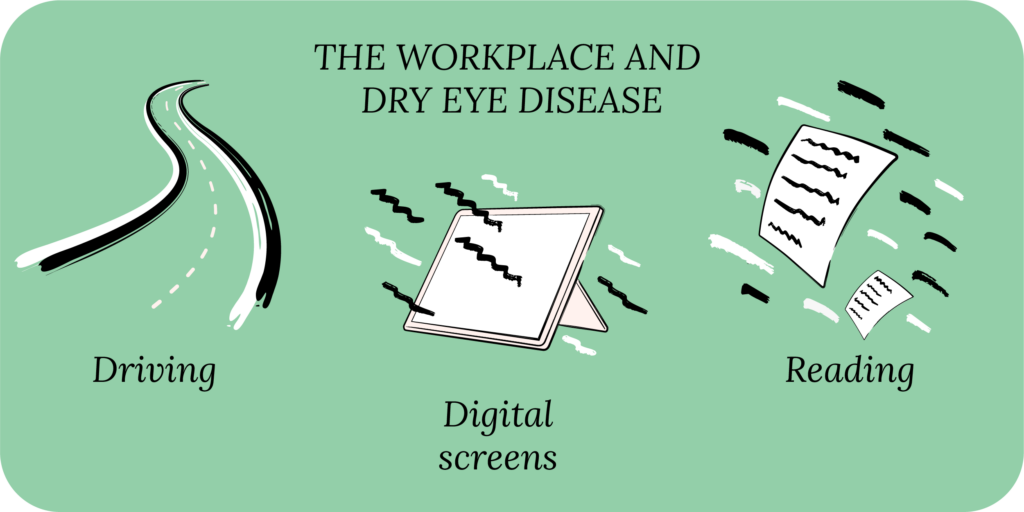
Uncorrected vision problems
If you experience frequent eye fatigue symptoms, schedule an eye exam with your eye doctor (optometrist or ophthalmologist). Uncorrected vision problems lead your eyes to strain to perform tasks, causing them to fatigue easily.³
Your eye doctor will check that your eye muscles are working properly and that your contact lens and eyeglasses prescription are up to date. He or she may also prescribe special eyewear for computer use. However, keep in mind that most eye doctors agree that blue light blocking glasses do not alleviate eye strain.⁸
Dry eye disease
Eye fatigue is a common symptom of dry eye disease. Dry eye disease (DED) is also known as dry eye syndrome, keratoconjunctivitis sicca and ocular surface disease. It is a chronic condition caused by unstable tears and inflammation and affects 30 million Americans.
While some of us experience tired, dry eyes from time to time, people with DED experience symptoms daily. Symptoms are typically severe enough to interfere with daily activities such as working, leisure, and sleep.⁵
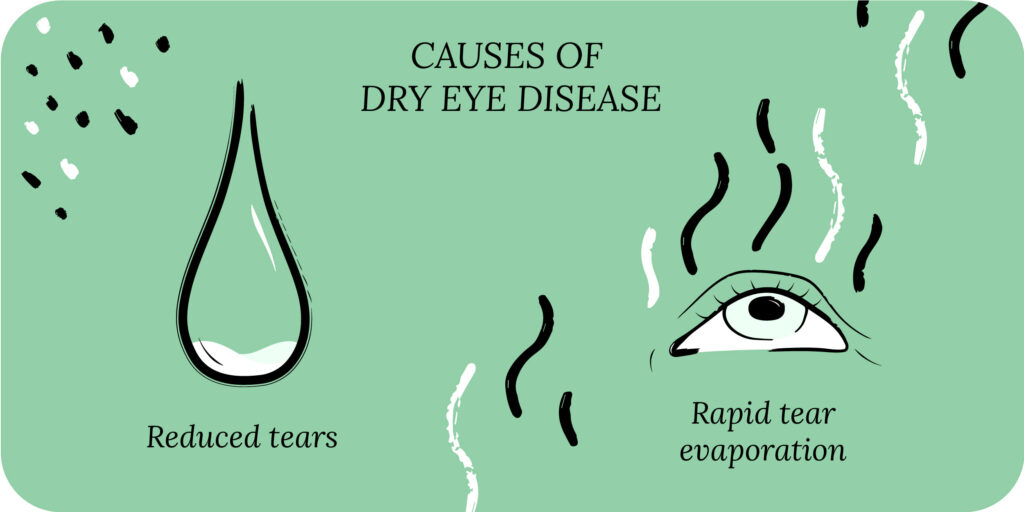
How to Alleviate Eye Fatigue
Occasionally suffering from eye fatigue can be annoying but manageable. We’ve mentioned before how lifestyle can impact eye health. These small changes can make a big difference in alleviating eye fatigue symptoms. If your symptoms get worse, it’s always best to schedule an eye examination and rule out any underlying causes.
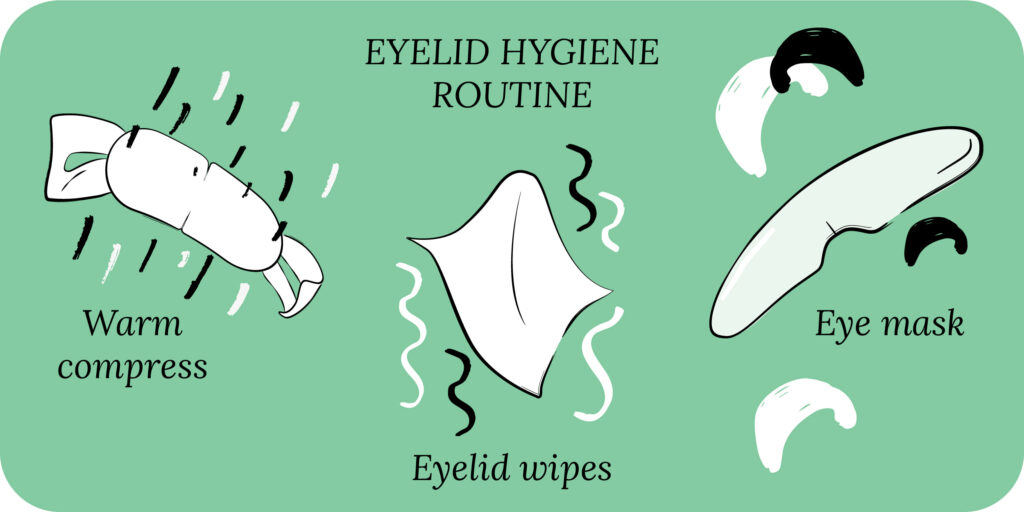
Practice good eyelid hygiene
Your eyelids are the shield that protects your eyes from the outside world and infections such as conjunctivitis and pink eye. You may have a great skincare routine and pay attention to your dental hygiene, but what about your eyes?
Tired eyes can benefit from a relaxing warm compress at night and refreshing eyelid wipes in the morning. A CorneaCare cold compress is soothing if your eyes feel inflamed during a long day. You can make wipes and compresses at home, or purchase convenient pre-packaged CorneaCare eyelid wipes. Everyone can benefit from establishing a daily eyelid hygiene regimen as part of their overall health and wellness.⁶
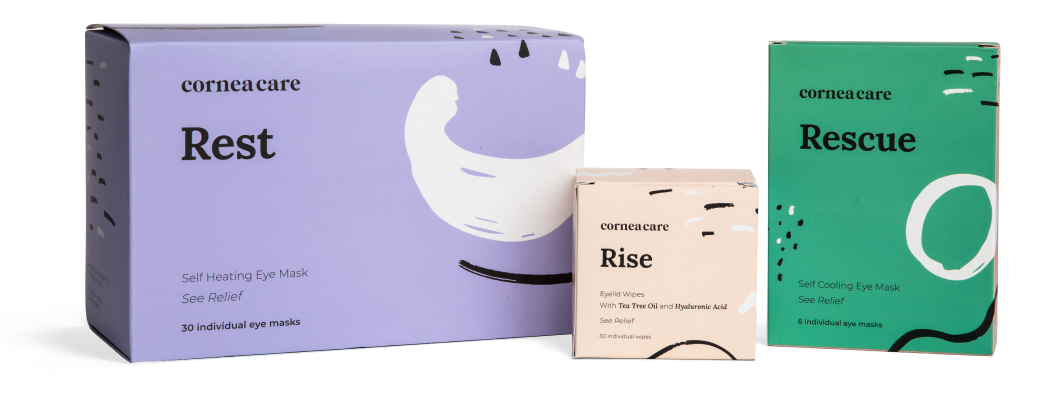
All Rounder
Eyelid Hygiene Plan 3
Perfect for eye dryness, burning, itching, grittiness, crusting/flaking of eyelashes and inflamed/swollen eyelids. Free shipping 📦.
Try today - $60
Refresh eyes with artificial tears
If your eyes feel fatigued, you are likely experiencing eye dryness as well. Artificial tears, or eye drops, can be beneficial in replenishing your tears and increasing comfort throughout the day. Eye drops can be made with preservatives or in preservative-free form. They may also contain emollients (fats or oils such as mineral, flaxseed or castor oil) or demulcents (water-soluble polymers).
You may need to try a few different eye drops before finding the one that works for you. It’s also important to consistently use one artificial tear for a few weeks before trying another.⁷ If you aren’t sure of the best artificial tear for you, ask your eye doctor to suggest one for you.
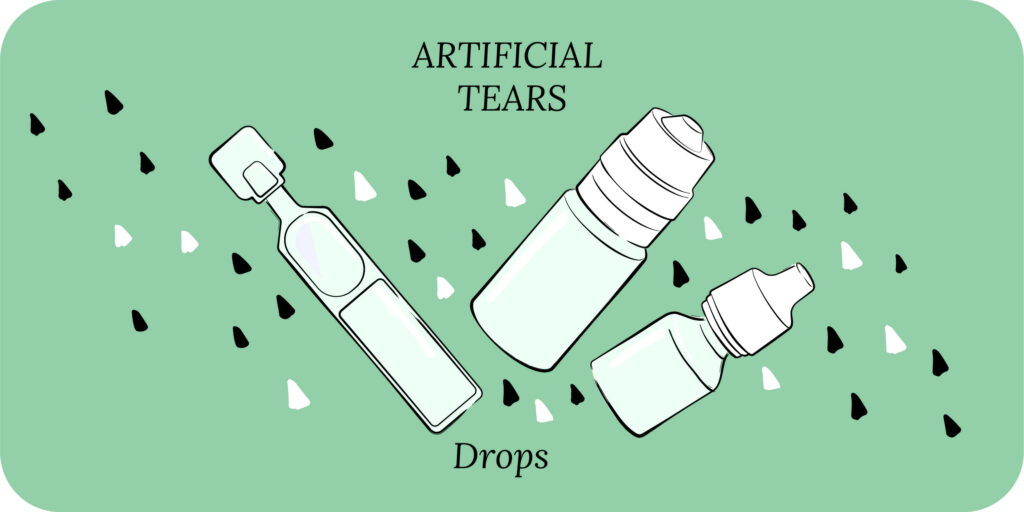
Give your eyes a rest
In addition to making sleep a priority, make sure to give your eyes proper breaks while working and performing tasks during the day. You’ve heard that standing every hour while working is good for your health. What about your eyes? Giving your eyes a break includes remembering to blink often and practicing the 20-20-20 rule.
When you’re working on a digital screen, remember to take a break after 20 minutes and look at something 20 feet away for 20 seconds.⁴ This allows your eyes to refocus. If you work outside or even drive for most of the day, you may want to consider sunglasses with ultraviolet (UV)-blocking lenses to prevent squinting.
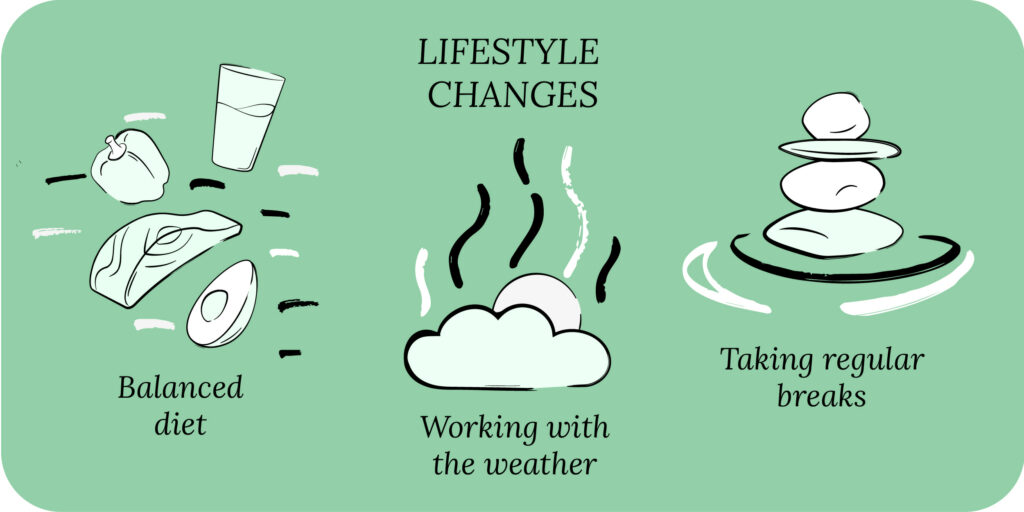
The Role of Nutrition in Preventing Eye Fatigue
Your diet plays a significant role in maintaining eye health and preventing fatigue. Eating a variety of foods rich in nutrients like omega-3 fatty acids, vitamin A, vitamin C, and zinc can help support eye function and reduce strain. Fatty fish, leafy greens, carrots, and citrus fruits are excellent choices for nourishing your eyes. CorneaCare eye vitamins can help you fill any nutritional gaps in your daily diet.9
Staying hydrated is equally important, as dehydration can exacerbate dryness and tiredness in your eyes. A well-balanced diet, paired with proper hydration, complements other lifestyle changes and ensures your eyes have the support they need to function optimally throughout the day.9
Why Do My Eyes Feel Tired FAQ
To get rid of tired eyes, take regular breaks from screen time to reduce eye strain, ensure proper lighting while reading or working, and use lubricating eye drops to keep your eyes moist. Applying a warm compress can help soothe the eye muscles, and practicing good sleep hygiene by getting adequate rest is crucial. Additionally, proper hydration and a diet that includes eye-friendly nutrients like omega-3 fatty acids and vitamin A can support your overall eye health.
Eyes can feel heavy due to a variety of factors, including lack of sleep, extended periods of screen time, or reading without adequate breaks. Allergies, dry eye disease, and eye strain from poor lighting or improper prescription glasses can also contribute to this sensation. Additionally, dehydration and certain medical conditions such as sinusitis or conjunctivitis might make your eyes feel heavy and fatigued.
When your eyes feel tired, it often indicates that they have been overworked or strained. This can result from prolonged screen use, reading, or focusing on tasks without taking breaks. It might also be a sign of inadequate sleep, dehydration, or exposure to poor lighting conditions. In some cases, tired eyes can signal underlying issues like dry eye disease, allergies, or an incorrect vision prescription, all of which should be addressed with proper care or consultation with an eye care professional.
Putting It All Together
Your eyes can feel tired for many reasons. Your daily habits and activities heavily impact your eye health. While many of us cannot avoid our jobs or put off household chores, we can practice simple steps like practicing good eyelid hygiene, using artificial tears, giving our eyes proper rest breaks, and visiting our doctor for regular eye exams.
Our goal at CorneaCare is to empower you to take control of your eye health. When your eyes feel good (and rested), you can focus on living a productive and happy life.
What’s Next
Interested in other ways to expand your eye wellness routine? Check out more tips on our Eye Health & Wellness blog.




